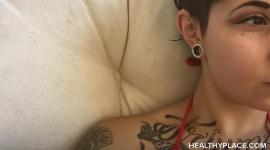What is Skin Picking, Excoriation Disorder?

Skin picking disorder, aka excoriation disorder, is a perplexing psychological condition. Merriam-Webster defines excoriation as the act of abrading or wearing off the skin. This can happen inadvertently in any number of ways, such as scratching an insect bite, or wearing ill-fitting shoes, or even popping a pimple. This seems innocuous in and of itself, but the darker side of skin picking, excoriation disorder, is getting increasing attention from medical experts these days.
What Is Excoriation Disorder?
Excoriation disorder is the act of compulsively picking skin. People refer to this disorder by several other names, including dermatillomania, skin picking disorder or compulsive skin picking. This skin picking disorder has long been recognized by mental health professionals, but now excoriation disorder officially appears in the Diagnostic and Statistical Manual for Mental Disorders, Fifth Edition (DSM-V). The DSM-V lists the disorder in the new chapter entitled, Obsessive-Compulsive and Related Disorders.
People with excoriation disorder have trouble controlling very strong urges to skin pick. Viewed by experts as a form of self-mutilation, this condition falls in the same family as compulsive nail biting and hair pulling. Although it's a separate condition, it's frequently seen in people who suffer from obsessive-compulsive disorder.
Classified as a body-focused repetitive behavior, it targets the face, but affects other areas of the body as well. The causes of this mental illness still require research and examination, but the results create definite concern in family members and mental health professionals who deal with skin picking patients ("Effects of Compulsive Skin Picking, Chronic Skin Picking").
Flaws in the skin, real or imagined, can trigger an impulse for the people who suffer with this disorder. The victim feels the impulse to remove the flaw and proceeds to pick at it. Sometimes prompted by a bump, an itch, or just an area where the skin looks or feels different, the repeated skin pick action can lead to bruising, bleeding, or infections. Subsequent scars and permanent disfigurement can result.
Picking Your Skin –A Cause For Concern?
Generally, picking your skin as a form of hygiene should not cause concern. People often find they need to squeeze a pimple, scrub off dead skin, or remove a hangnail. Even the unconscious act of scratching an irritation until it gets worse does not pose a serious problem. According to the International OCD Foundation, "Skin picking is not considered a disorder unless it is often and/or bad enough to cause significant distress or problems in other areas of life." Sufferers of picking disorders focus on various parts of the body, including the face, scalp, cuticles, and back. All the extremities – hands, feet, arms and legs – can become the focus of this behavior as well.
Reasons vary, but stress most often triggers the episodes. Sufferers resort to skin picking to relieve stress, but then experience increased stress from guilt or shame. Others, perfectionists, seek to eliminate flaws in their skin. Paradoxically, picking your skin leads to more flaws. Both of these examples show different self-perpetuating cycles that help lead to excoriation disorder.
Permanent physical damage stands as the biggest concern for skin picking disorder sufferers. In addition, sufferers eventually find they have to take measures to hide the physical evidence of their condition. They become ashamed, less social. Relationships become strained, potentially creating problems with family, friends, and at work. Left untreated, excoriation disorder at its worst debilitates its victims. If you have concerns that your tendency to skin pick could require medical attention, do not hesitate to bring it up to your doctor.
APA Reference
Gluck, S.
(2022, January 10). What is Skin Picking, Excoriation Disorder?, HealthyPlace. Retrieved
on 2026, January 25 from https://www.healthyplace.com/ocd-related-disorders/excoriation-skin-picking-disorder/what-is-skin-picking-excoriation-disorder



